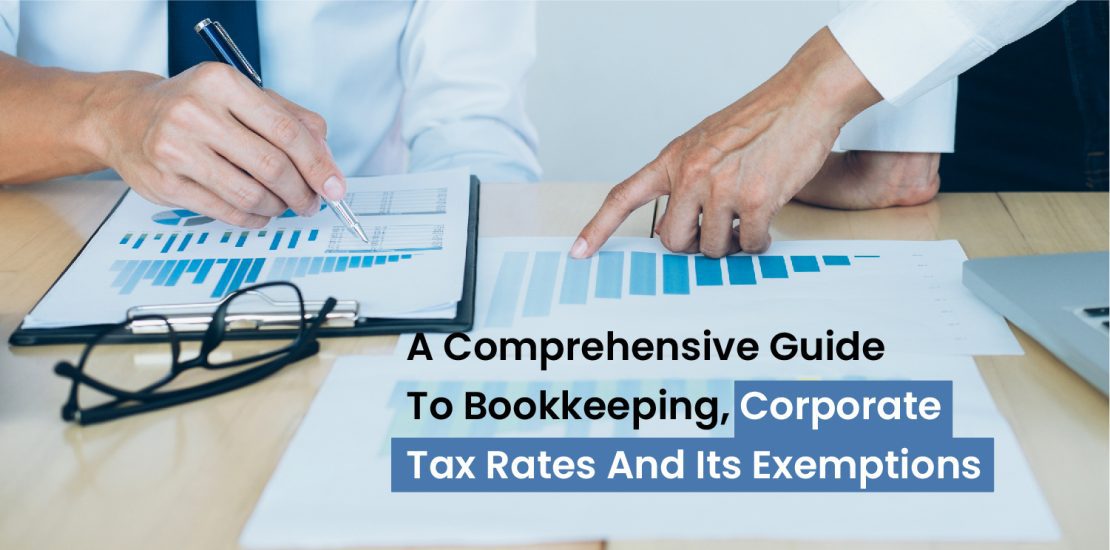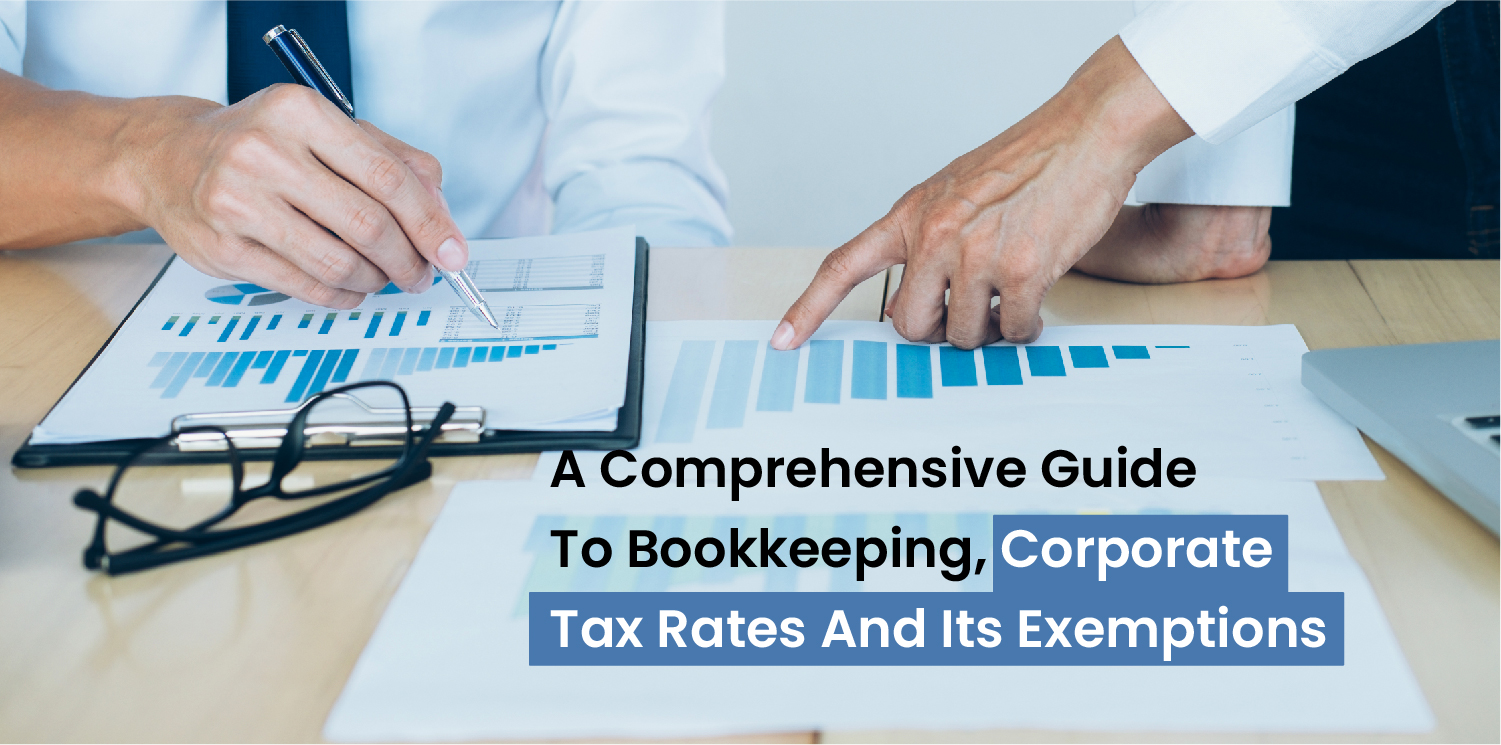A Comprehensive Guide to Bookkeeping, Corporate Tax Rates And Its Exemptions
- October 2, 2023
- Posted by: admin
- Category: Corporate Income Tax

In United Arab Emirates (UAE) understanding the intricacies of bookkeeping and corporate tax rates is important for any enterprise. This comprehensive guide aims to shed light on these critical aspects, ensuring that business owners, entrepreneurs, and financial enthusiasts are well-equipped with the knowledge they need.
What is Bookkeeping?
Bookkeeping is the systematic process of recording, organizing, and tracking financial transactions within a business. It involves documenting every financial aspect, from income and expenses to assets and liabilities. Essentially, it’s the financial backbone of any enterprise.
Components of Bookkeeping
Bookkeeping records should include income statements, balance sheets, cash flow statements, and general ledgers. Keeping these records up-to-date is essential for compliance and decision-making.
Bookkeeping Standards in the UAE
The UAE follows international accounting standards, primarily the International Financial Reporting Standards (IFRS). These standards ensure consistency and transparency in financial reporting.
Bookkeeping Practices in the UAE
The UAE has strict regulations regarding bookkeeping, and it’s important to understand these requirements to avoid penalties and legal issues. You’ll also need to decide whether to handle bookkeeping in-house or outsource it.
Why is Bookkeeping Essential?
Bookkeeping serves as a backbone of financial management for any business. It helps you:
Track Finances
Bookkeeping allows you to keep a close eye on your company’s financial health.
Make Informed Decisions
With accurate financial records, you can make informed decisions about your business’s future.
Comply with Regulations
In the UAE, maintaining proper financial records is a legal requirement.
Tax Calculations
It’s vital for calculating your taxes accurately.
Outsourcing Bookkeeping
Many businesses in the UAE opt to outsource bookkeeping to professional firms. This can save time and ensure accuracy. BRISK offers bookkeeping services in the UAE. With their expertise and experience in the field of financial management, BRISK can assist you in maintaining accurate records, ensuring compliance with local regulations, and optimizing your financial processes.
What is Corporate Tax?
Corporate tax, abbreviated as CT, is a direct tax imposed on the net income or profits earned by corporations and other entities as a result of their business operations. In some regions, it may also be known as ‘Corporate Income Tax (CIT)’ or ‘Business Profits Tax.
Corporate Tax Rates in UAE
One of the primary attractions for businesses in the UAE is its favorable tax environment.
Startups and Small Businesses
The UAE imposes zero percent corporate income tax on small business businesses if their annual revenue is upto 3 million AED.
Corporate Tax for all Businesses
Taxable income up to AED $375,000 is subject to a 0% tax rate.
Taxable income exceeding AED $375,000 is subject to a 9% tax rate.
Corporate Tax Exemption Policies?
Several exemptions are available for companies operating in various sectors. Entities exempt from corporate taxes include government and government-controlled entities, businesses involved in natural resources (both extractive and non-extractive), qualifying public benefit organizations, qualifying investment funds, public pension or social security funds, as well as private pension or social security funds.
Types of Businesses Eligible for Exemption
The UAE’s corporate tax exemption policies are not exclusive to any particular industry. They apply to a wide range of businesses, including:
a. Free Zone Companies
Companies registered within one of the UAE’s numerous free zones are often eligible for tax exemptions. These free zones provide a unique environment for businesses to thrive, with benefits extending beyond tax exemptions.
- Zero taxation.
- No customs duties for import and export.
- No need to partner with a local entity to establish a company.
- Full foreign ownership.
- Shareholders and employees are eligible for UAE residency visas.
b. Offshore Companies
Companies are permitted to conduct their business activities outside the United Arab Emirates and are not allowed to engage in business within the country.
- Utilizes legal, accounting, auditing, management consultancy, and similar services from professionals based in the UAE.
- Ensures the preparation and maintenance of its books and records within the UAE.
- Conducts meetings of its directors or members within the UAE.
- Leases a property for use as a registered office or owns real property in any freehold areas where foreign ownership is permitted.
- Maintains a bank account with UAE banks for the purpose of executing its routine operational transactions.
Advantages of UAE’s Tax Exemption Policies
The UAE corporate tax exemption policies offer several distinct advantages for businesses:
Cost Efficiency
The absence of corporate income tax and customs duties in free zones significantly reduces operational costs, making the UAE an attractive destination for businesses aiming to optimize their bottom line.
Foreign Investment
The opportunity for full foreign ownership in free zones encourages foreign investment and fosters a diverse business environment.
Tax Planning
The presence of DTAs(Deep Trade Agreements) ensures that businesses can engage in effective tax planning, minimizing the risk of double taxation.
Stability and Security
The UAE’s political stability and business-friendly environment provide a secure platform for long-term business growth.



